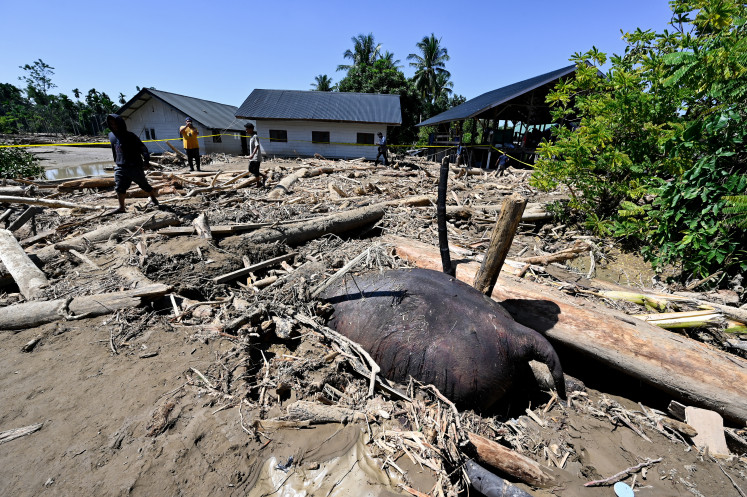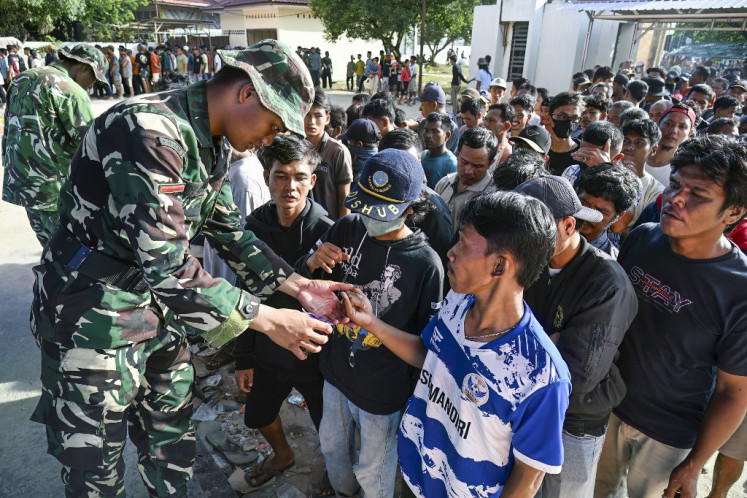Popular Reads
Top Results
Can't find what you're looking for?
View all search resultsPopular Reads
Top Results
Can't find what you're looking for?
View all search resultsIndonesia enters early stages of aging population
As Indonesia enters the early stages of an aging population, experts have called on the government to reactivate the dormant National Commission for the Elderly (Komnas Lansia) to better organize programs designed for the country's more than 25 million citizens aged 60 and above
Change text size
Gift Premium Articles
to Anyone
A
s Indonesia enters the early stages of an aging population, experts have called on the government to reactivate the dormant National Commission for the Elderly (Komnas Lansia) to better organize programs designed for the country's more than 25 million citizens aged 60 and above.
The commission was established in 2004 to ensure the welfare of the elderly but has reportedly been inactive since 2015 because of internal reasons.
Tri Budi Wahyuni Raharjo, a professor at the University of Indonesia (UI) and advisor for the Elderly-Friendly Indonesia Foundation (IRL), said that ever since the commission went inactive, coordination and synchronization between the central government, local administrations and other stakeholders on programs for the elderly had become more difficult.
"The ministries are very sectoral and they have their own main tasks and functions [...] When the commission was still active, it did a good job of coordinating all concerned ministries, universities, civil society organizations and other important stakeholders," Tri told reporters on the sidelines of a recent discussion on the elderly.
She cited regional commissions called Komda Lansia that are still active in several regions and are led directly by deputy regional leaders such as deputy governors, regents and mayors. Thus coordination between related agencies was hassle free, she said.
"In South Korea, the national commission for the elderly is led directly by the president. [...] if Komnas Lansia was led by our president as well, then all programs could run well and Indonesia could be the elderly-friendly country it wishes to become," Tri added.
In 2019, elderly people, or those aged 60 years old and above, account for 9.7 percent of the population at 25.9 million. This means Indonesia has entered the aging population phase, which is marked by having an elderly population that accounts for 7 percent or more of the total population. The number is predicted to rise to 48.2 million, or 15.7 percent of the population, by 2035.
Statistics Indonesia (BPS) projected the number to reach 63.31 million or 20 percent of Indonesia's population by 2045, while the United Nations estimated the elderly would account for 25 percent of the population, totaling 74 million, by 2050.
[...] those aged 60 years old and above, account for 9.7 percent of the population at 25.9 million [...] Indonesia has entered the aging population phase.
Echoing Tri, Trisakti University academic Nugroho Abikusno, who has conducted a number of studies on aging, said that Asia Pacific countries with active special national commissions for the elderly were the ones able to successfully carry out the 2002 Madrid International Plan of Action on Ageing, which covers the elderly's participation in state development, improved health and social services for the elderly and better elderly friendly environments. Indonesia was among the countries that signed the plan.
"These commissions are led by each country's highest authority. I don't think imposing the role on a certain ministry's director general would allow for as good coordination. [...] The prosperity of a country will lead to growth in the number of its elderly. Paying respect to the elderly, in turn, will also better develop the country," he told the panel discussion.
Nugroho said the elderly needed to remain healthy and productive in their old age to contribute to state development, and, as such, better work environments had to be built from early on. He cited the example of schools for the elderly, run by the IRL foundation alongside Respati University, that help the elderly develop new skills.
Tri, who oversees the schools, said they started in Bantul, Central Java, and provided classes on, among other topics, health, financial management, agriculture and disaster mitigation.
In 2018, almost 50 percent of Indonesia’s elderly remained in work, according to BPS's 2018 Elderly Statistics Report. The report, however, deemed that working conditions for the elderly were far from decent.
Of those in work, 47.59 percent did not graduate from elementary school, while 33.5 percent were elementary school graduates. A majority of elderly workers, 54.23 percent, worked in the agriculture sector, which the report linked to low pay and negative impacts on the welfare of the elderly.
Almost 10 percent of the elderly, including those in agriculture and other sectors, were considered precarious workers, meaning their pay and work hours were not certain.
In total, 50.39 percent were in vulnerable employment, which relies heavily on demand. The elderly in this kind of employment could easily fall into poverty if demand decreases, the report stated.
In terms of work hours, 17.96 percent worked longer than decent work hours and 33.8 percent received low wages, the report revealed.
The Social Affairs Ministry's director for social rehabilitation for the elderly, Andi Hanindito, said in his opening remarks at Tuesday’s meeting that the elderly needed to be involved in state development as a subject actor, not only as the object of development.
Andi, however, refused to comment on calls for the reactivation of Komnas Lansia on the sidelines of the meeting, but conceded that better coordination was needed between the central government and local administrations. The latter, he said, had to be on the frontlines in empowering and managing the elderly.
"Around 2 million elderly people are considered to not have potential, meaning they are bedridden or they can't resume normal activities, and economically, a majority of them are considered poor," Andi said.
The BPS report stated that the dependency ratio between the elderly and productive aged people increased to 14.49:100 in 2018 compared to 14.02:100 the previous year, meaning that every 100 productive age people had to shoulder the needs of more than 14 elderly people last year.










